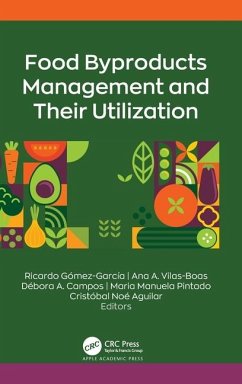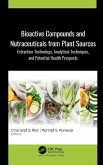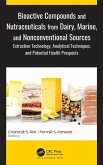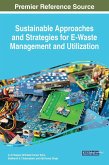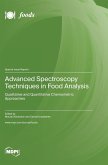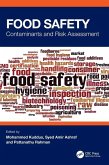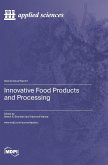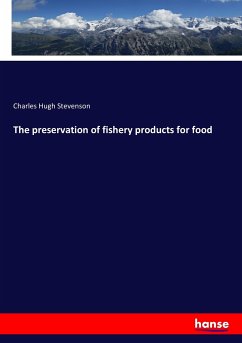Food Byproducts Management and Their Utilization
Herausgeber: Gómez-García, Ricardo; Campos, Débora A.; Vilas-Boas, Ana A.
Food Byproducts Management and Their Utilization
Herausgeber: Gómez-García, Ricardo; Campos, Débora A.; Vilas-Boas, Ana A.
- Gebundenes Buch
- Merkliste
- Auf die Merkliste
- Bewerten Bewerten
- Teilen
- Produkt teilen
- Produkterinnerung
- Produkterinnerung
Discusses food byproducts as value-added renewable sources using biotechnologies that avoid hazardous chemicals. It explores the value-added properties of food wastes and looks at waste byproducts of various crops, their health-benefiting bioactive compounds, and biotechnological strategies to extract, produce, and recover compounds.
Andere Kunden interessierten sich auch für
![Bioactive Compounds and Nutraceuticals from Plant Sources Bioactive Compounds and Nutraceuticals from Plant Sources]() Bioactive Compounds and Nutraceuticals from Plant Sources221,99 €
Bioactive Compounds and Nutraceuticals from Plant Sources221,99 €![Bioactive Compounds and Nutraceuticals from Dairy, Marine, and Nonconventional Sources Bioactive Compounds and Nutraceuticals from Dairy, Marine, and Nonconventional Sources]() Bioactive Compounds and Nutraceuticals from Dairy, Marine, and Nonconventional Sources220,99 €
Bioactive Compounds and Nutraceuticals from Dairy, Marine, and Nonconventional Sources220,99 €![Sustainable Approaches and Strategies for E-Waste Management and Utilization Sustainable Approaches and Strategies for E-Waste Management and Utilization]() Sustainable Approaches and Strategies for E-Waste Management and Utilization273,99 €
Sustainable Approaches and Strategies for E-Waste Management and Utilization273,99 €![Advanced Spectroscopy Techniques in Food Analysis Advanced Spectroscopy Techniques in Food Analysis]() Advanced Spectroscopy Techniques in Food Analysis84,99 €
Advanced Spectroscopy Techniques in Food Analysis84,99 €![Food Safety Food Safety]() Food Safety208,99 €
Food Safety208,99 €![Innovative Food Products and Processing Innovative Food Products and Processing]() Innovative Food Products and Processing83,99 €
Innovative Food Products and Processing83,99 €![The preservation of fishery products for food The preservation of fishery products for food]() Charles Hugh StevensonThe preservation of fishery products for food21,90 €
Charles Hugh StevensonThe preservation of fishery products for food21,90 €-
-
-
Discusses food byproducts as value-added renewable sources using biotechnologies that avoid hazardous chemicals. It explores the value-added properties of food wastes and looks at waste byproducts of various crops, their health-benefiting bioactive compounds, and biotechnological strategies to extract, produce, and recover compounds.
Hinweis: Dieser Artikel kann nur an eine deutsche Lieferadresse ausgeliefert werden.
Hinweis: Dieser Artikel kann nur an eine deutsche Lieferadresse ausgeliefert werden.
Produktdetails
- Produktdetails
- Verlag: Apple Academic Press
- Seitenzahl: 522
- Erscheinungstermin: 9. Januar 2024
- Englisch
- Abmessung: 240mm x 161mm x 32mm
- Gewicht: 942g
- ISBN-13: 9781774912959
- ISBN-10: 1774912953
- Artikelnr.: 69431179
- Herstellerkennzeichnung
- Libri GmbH
- Europaallee 1
- 36244 Bad Hersfeld
- gpsr@libri.de
- Verlag: Apple Academic Press
- Seitenzahl: 522
- Erscheinungstermin: 9. Januar 2024
- Englisch
- Abmessung: 240mm x 161mm x 32mm
- Gewicht: 942g
- ISBN-13: 9781774912959
- ISBN-10: 1774912953
- Artikelnr.: 69431179
- Herstellerkennzeichnung
- Libri GmbH
- Europaallee 1
- 36244 Bad Hersfeld
- gpsr@libri.de
Ricardo Gómez-García is a PhD student at the Centre of Biotechnology and Fine Chemistry (CBQF) in the School of Biotechnology at Catholic University of Portugal, Porto, Portugal. He graduated as a chemical engineer from the School of Chemistry at Autonomous University of Coahuila (UA de C), Mexico. He started his scientific career at the Food Research Department at the U A de C, where he developed his expertise in food engineering and technology, food chemistry, and biotechnology. Currently, his PhD work involves developing innovative and sustainable technologies within the context of zero-waste and circular economy approach for the extraction and identification of functional bioactive compounds with industrial interest from fruit by-products for their valorization and reincorporation into the industrial value chains. Mr. Gómez-García is the author and co-author of 16 articles in indexed journals, and several chapters in books of international circulation. He holds one European provisional patent and a national patent application. He has participated in more than 15 international congresses in areas related with biotechnology, food science and technology, and bioengineering. In addition, he has been participating in several national and international entrepreneurship programs in Portugal and across Europe through the European Institute of Innovation & Technology (EIT Food). Ana A. Vilas-Boas is a PhD student at the Centre of Biotechnology and Fine Chemistry (CBQF) in the School of Biotechnology at Catholic University of Portugal, Porto, Portugal. Ms. Vilas-Boas holds a BSc in Biotechnology, an MSc in Food Engineering and is currently a PhD student in Biotechnology at the Catholic University of Portugal. She has expertise as a researcher within the framework of diverse national and European projects, such as ESSENCE (2017), FODIAC (2018), Nature Bioactive Food (2020), and MEDISMART (present) project at the Centre for Biotechnology and Fine Chemistry (CBQF) of Catholic University of Portugal. She has been working directly with some Portuguese industries in the context of food by-products and non-compliant food management from food industrial chains to characterize and identify value-added bioactive compounds. Currently, her PhD work involves the development of innovative, integrative, and sustainable processes to valorize orange by-products within the circular economy context for the extraction of hesperidin and pectin to develop a novel nutraceutical to enhance gut microbiota health. She has published 12 articles in indexed journals, several chapters in books, and several international congress communications. In addition, she has participated in entrepreneur programs and was awarded first place in Ecotrophelia Portugal (2018), Innovation Track (2018), and Born from Knowledge-Ideas (2019). Débora A. Campos, PhD, is a postdoctoral researcher at the School of Biotechnology at Catholic University of Portugal, Porto, Portugal. Dr. Campos's scientific work is on waste/by-products valorization from agro-industrial origin, where she is developing innovative and sustainable green technologies for the extraction/separation of compounds of industrial interest. This work allowed her submission and acceptance of a European patent for a new industrial technology application. She has carried out scientific research work in different areas, green nanotechnology, and microbiology. She has been working on several European projects and programs within the framework of entrepreneurism approach, such as LAB2BUSINESS (Porto, 2017), Global Food Venture-EIT Food (2018), and EIT Food Innovator Fellowship (2019). Dr. Campos holds a BSc in Bioscience, a MSc in Applied Microbiology, and a PhD in Biotechnology, all awarded by the Catholic University of Portugal, where she is currently doing postdoctoral work within the MIRACLE-H2020 Eu project (ending in 2022). Finally, Dr. Campos has published 34 scientific articles in international journals and several book chapters. She is a co-advisor of PhD theses. She holds one granted European patent and a national patent. She has participated in scientific European projects and has attended over 25 international congresses in the area of foods and functional ingredients. Maria Manuela Pintado, PhD, is Director of the Centre of Biotechnology and Fine Chemistry (CBQF) in the School of Biotechnology at the Catholic University of Portugal. As Associate Professor, she works on the interface of microbiology with health. Professor Pintado has developed numerous projects of I & D+I (with companies and scientific institutions, both national and international) in the areas of valuing of by-products and residues, production and characterization of bioactive compounds, functional foods, and natural antimicrobials. Additionally, she has been advisor of 18 PhD theses, 16 postdoctoral fellowships, 36 MSc theses, and 54 BSc theses. She is Pharmaceutic by the University of Portugal; she has an MSc in Food Science and Engineering, and her PhD is in Biotechnology, both earned at the Centre of Biotechnology and Fine Chemistry at her university. Dr. Pintado has published more than 320 papers in indexed journals, 35 book chapters, 34 proceedings, and more than 150 contributions in scientific meetings, and holds 20 patents. Cristóbal Noé Aguilar, PhD, is a Director of Research and Postgraduate Programs at the Universidad Autonoma de Coahuila, Mexico. Dr. Aguilar has published more than 360 papers in indexed journals, and 450 contributions in scientific meetings. He has also edited more than 30 books. He has been awarded several prizes and awards, the most important of which are the National Prize of Research (2010) from the Mexican Academy of Sciences; the Prize CCC-2008 from the Mexican Society of Biotechnology and Bioengineering; National Prize AgroBio-2005; and the Mexican Prize in Food Science and Technology. In 2019 he received the Outstanding Research Award by the International Association of Bioprocessing (IBA). Dr. Aguilar is a member of the Mexican Academy of Science, the Central Council of the International Bioprocessing Association, the Mexican Academy of Sciences, the Mexican Society for Biotechnology and Bioengineering, and the Mexican Association for Food Science and Biotechnology. He has developed more than 41 research projects, including 25 international exchange projects.
Part 1: Food Byproducts Generation and Their Valuable Bioactive Compounds
1. Tomato Agro-Industrial Wastes as Rich Source of Bioactive Compounds 2.
Quantification and Use of Food Losses: The Case of the Cantaloupe Melon of
the North-Central Region of Mexico 3. Biotechnological Potential of
Nejayote: A Residue of the Tortilla Industry 4. Byproducts of the Berry
Juice Industry: Phytochemical Recovery and Valuable Applications 5.
Value-Added Lipids from Plant Foods and Respective Applications 6.
Antioxidant Dietary Fiber from Food Byproducts: Case Studies Part 2:
Technological Strategies for Bioactive Compounds Recovery 7. Biotechnology
Strategies to Produce and Recover Bioactive Compounds from Spent Coffee
Grounds 8. Biotechnological Cost-Effective Processes for the Extraction of
Bioactive Compounds 9. Waste Valorization through Eco-Innovative
Technologies and Yeast Conversion into High-Value Products 10. Use of Peel
and Seed of Tropical Fruits Processed through Flash Vacuum Expansion 11.
Recovery of Macromolecules of Biotechnological and Pharmaceutical
Importance from Soybean Hull 12. Antimicrobial Activity of Olive Leaf
Extract: Bioactives Extraction and Potential as Food Preservative Part 3:
Recent Applications and Advances on Bioactive Compounds from Food and
By-Products 13. Biological Activities from Vegetal Products in Latin
America 14. Encapsulation of Procyanidins Compounds from Natural Sources
15. Pectin from By-Products in the Food Industry: Trends and Opportunities
16. Agave By-Products as Sources of Phytochemicals with Functional
Activities and Their Management for Industrial Applications 17. Food
By-Products as Potential Functional Ingredients for Animal Feeding 18.
Bioactive Properties and Potential Utility of Extractable and
Non-Extractable Phytochemical Fractions from Selected Fruits and
Horticultural Wastes
1. Tomato Agro-Industrial Wastes as Rich Source of Bioactive Compounds 2.
Quantification and Use of Food Losses: The Case of the Cantaloupe Melon of
the North-Central Region of Mexico 3. Biotechnological Potential of
Nejayote: A Residue of the Tortilla Industry 4. Byproducts of the Berry
Juice Industry: Phytochemical Recovery and Valuable Applications 5.
Value-Added Lipids from Plant Foods and Respective Applications 6.
Antioxidant Dietary Fiber from Food Byproducts: Case Studies Part 2:
Technological Strategies for Bioactive Compounds Recovery 7. Biotechnology
Strategies to Produce and Recover Bioactive Compounds from Spent Coffee
Grounds 8. Biotechnological Cost-Effective Processes for the Extraction of
Bioactive Compounds 9. Waste Valorization through Eco-Innovative
Technologies and Yeast Conversion into High-Value Products 10. Use of Peel
and Seed of Tropical Fruits Processed through Flash Vacuum Expansion 11.
Recovery of Macromolecules of Biotechnological and Pharmaceutical
Importance from Soybean Hull 12. Antimicrobial Activity of Olive Leaf
Extract: Bioactives Extraction and Potential as Food Preservative Part 3:
Recent Applications and Advances on Bioactive Compounds from Food and
By-Products 13. Biological Activities from Vegetal Products in Latin
America 14. Encapsulation of Procyanidins Compounds from Natural Sources
15. Pectin from By-Products in the Food Industry: Trends and Opportunities
16. Agave By-Products as Sources of Phytochemicals with Functional
Activities and Their Management for Industrial Applications 17. Food
By-Products as Potential Functional Ingredients for Animal Feeding 18.
Bioactive Properties and Potential Utility of Extractable and
Non-Extractable Phytochemical Fractions from Selected Fruits and
Horticultural Wastes
Part 1: Food Byproducts Generation and Their Valuable Bioactive Compounds
1. Tomato Agro-Industrial Wastes as Rich Source of Bioactive Compounds 2.
Quantification and Use of Food Losses: The Case of the Cantaloupe Melon of
the North-Central Region of Mexico 3. Biotechnological Potential of
Nejayote: A Residue of the Tortilla Industry 4. Byproducts of the Berry
Juice Industry: Phytochemical Recovery and Valuable Applications 5.
Value-Added Lipids from Plant Foods and Respective Applications 6.
Antioxidant Dietary Fiber from Food Byproducts: Case Studies Part 2:
Technological Strategies for Bioactive Compounds Recovery 7. Biotechnology
Strategies to Produce and Recover Bioactive Compounds from Spent Coffee
Grounds 8. Biotechnological Cost-Effective Processes for the Extraction of
Bioactive Compounds 9. Waste Valorization through Eco-Innovative
Technologies and Yeast Conversion into High-Value Products 10. Use of Peel
and Seed of Tropical Fruits Processed through Flash Vacuum Expansion 11.
Recovery of Macromolecules of Biotechnological and Pharmaceutical
Importance from Soybean Hull 12. Antimicrobial Activity of Olive Leaf
Extract: Bioactives Extraction and Potential as Food Preservative Part 3:
Recent Applications and Advances on Bioactive Compounds from Food and
By-Products 13. Biological Activities from Vegetal Products in Latin
America 14. Encapsulation of Procyanidins Compounds from Natural Sources
15. Pectin from By-Products in the Food Industry: Trends and Opportunities
16. Agave By-Products as Sources of Phytochemicals with Functional
Activities and Their Management for Industrial Applications 17. Food
By-Products as Potential Functional Ingredients for Animal Feeding 18.
Bioactive Properties and Potential Utility of Extractable and
Non-Extractable Phytochemical Fractions from Selected Fruits and
Horticultural Wastes
1. Tomato Agro-Industrial Wastes as Rich Source of Bioactive Compounds 2.
Quantification and Use of Food Losses: The Case of the Cantaloupe Melon of
the North-Central Region of Mexico 3. Biotechnological Potential of
Nejayote: A Residue of the Tortilla Industry 4. Byproducts of the Berry
Juice Industry: Phytochemical Recovery and Valuable Applications 5.
Value-Added Lipids from Plant Foods and Respective Applications 6.
Antioxidant Dietary Fiber from Food Byproducts: Case Studies Part 2:
Technological Strategies for Bioactive Compounds Recovery 7. Biotechnology
Strategies to Produce and Recover Bioactive Compounds from Spent Coffee
Grounds 8. Biotechnological Cost-Effective Processes for the Extraction of
Bioactive Compounds 9. Waste Valorization through Eco-Innovative
Technologies and Yeast Conversion into High-Value Products 10. Use of Peel
and Seed of Tropical Fruits Processed through Flash Vacuum Expansion 11.
Recovery of Macromolecules of Biotechnological and Pharmaceutical
Importance from Soybean Hull 12. Antimicrobial Activity of Olive Leaf
Extract: Bioactives Extraction and Potential as Food Preservative Part 3:
Recent Applications and Advances on Bioactive Compounds from Food and
By-Products 13. Biological Activities from Vegetal Products in Latin
America 14. Encapsulation of Procyanidins Compounds from Natural Sources
15. Pectin from By-Products in the Food Industry: Trends and Opportunities
16. Agave By-Products as Sources of Phytochemicals with Functional
Activities and Their Management for Industrial Applications 17. Food
By-Products as Potential Functional Ingredients for Animal Feeding 18.
Bioactive Properties and Potential Utility of Extractable and
Non-Extractable Phytochemical Fractions from Selected Fruits and
Horticultural Wastes

